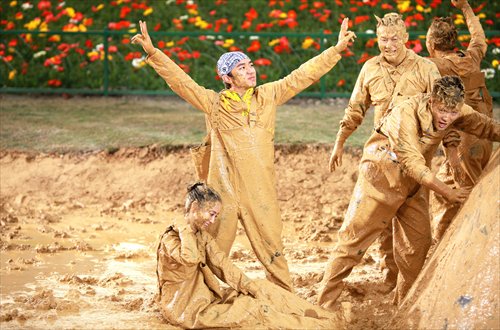HOME >> ARTS
China’s watchdog teaches producers how to make reality shows
Source:Global Times Published: 2015-8-31 18:23:01

A still from TV reality show Running Man Photo: CFP
After an announcement that it would strengthen regulations concerning reality TV shows, the State Administration of Press, Publication, Radio, Film and Television (SAPPRFT) hosted a training course for reality show producers on how to make proper reality shows on August 25.
A total of 120 people, including reality TV producers and executives from major satellite broadcasters and production studios, attended the event.
At the start of the course, SAPPRFT Deputy Director Tian Jin pointed out that reality TV's emphasis on celebrity and pomp has been detrimental to the medium. He emphasized reality shows should focus on grass-roots people from all walks of life instead of celebrities.
"Relying too heavily on imported models for shows may adversely impact creativity and the safety of national culture. Reality shows need to be independently creative and focus on taking advantage of overseas experience to develop original shows with Chinese characteristics," Tian added.
Reality TV has been a major battlefield for domestic TV stations in recent years. From outdoor adventure reality shows like Running Man, The Amazing Race and Go Fighting to parent-child shows like Where are We Going, Dad? and Dad Came Home, non-scripted programming has become a major driving force behind viewership ratings.
However, most of the current popular shows in China are based on overseas versions from places like South Korea or the US. In order to get their own piece of the pie, an increasing number of broadcasters have started spending huge amounts of money to purchase the copyrights to overseas reality shows, while also inviting an increasing number of big-name stars to take part in these shows.
This of course has greatly benefited some celebrities. Their behavior on these shows has become a major water-cooler topic for viewers, leading many celebrities to even greater popularity.
Seeing this reliance on overseas and stardom, SAPPRFT has decided to cool things off.
At the training course, Leng Song, director of the Global Communication Research Center at the Chinese Academy of Social Sciences, explained some of SAPPRFT's motivations for getting involved.
He said that while reality shows satisfy the desires of audiences to get a glimpse into the lives of other people, such "prying" should fall within the ethical and value boundaries of society. If shows neglect these boundaries, SAPPRFT is worried that will negatively impact the values of audiences.
The overuse of superstars is another issue.
An article on the People's Daily titled "Actors, Don't Waste Your Time on Reality Shows" on Thursday pointed out that the TV and film industry is suffering from an "actor shortage" in which some productions can't begin filming because so many stars have turned to reality TV.
The article said that while it's understandable that stars want more money and fame, they should not forget their duties as actors and so devote more of their time and energy into improving their skills as performers.
"There are no benefits, only drawbacks, when a famous actor spends too much time on a variety show. Unless they are already tired of their jobs and have decided to change professions," the article wrote.
The new regulations look to reduce the number of celebrities on reality shows, while doing more to promote charity events.
According to SAPPRFT, reality shows, which are popular among young people, should add more meaningful content that can educate audiences and promote concern for humanity.
Global Times
Newspaper headline: TV by the numbers
Posted in: TV